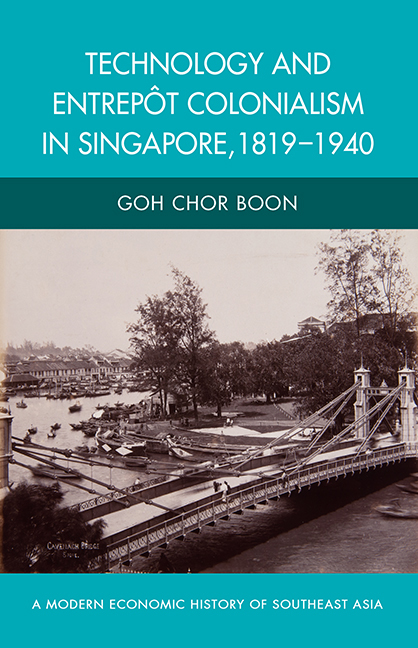Book contents
- Frontmatter
- Contents
- List of Figures and Tables
- Notes on Currency
- Introduction
- 1 Technology and the British Empire
- 2 Pioneers of Change: Entrepreneurs and Engineers
- 3 Maritime Technology and Development of the Port
- 4 Introducing Technological Systems
- 5 Sanitation and Public Health
- 6 Agriculture and Colonial Science
- 7 Food and Singapore Cold Storage
- 8 Politics of Imperial Education
- 9 Technology Transfer and Limited Industrial Growth
- Conclusion
- Bibliography
- Index
Conclusion
Published online by Cambridge University Press: 21 October 2015
- Frontmatter
- Contents
- List of Figures and Tables
- Notes on Currency
- Introduction
- 1 Technology and the British Empire
- 2 Pioneers of Change: Entrepreneurs and Engineers
- 3 Maritime Technology and Development of the Port
- 4 Introducing Technological Systems
- 5 Sanitation and Public Health
- 6 Agriculture and Colonial Science
- 7 Food and Singapore Cold Storage
- 8 Politics of Imperial Education
- 9 Technology Transfer and Limited Industrial Growth
- Conclusion
- Bibliography
- Index
Summary
Without the aid of technological implements and scientific knowledge, vast areas of the world not have been subjugated by Britain. But technology was not a cause of imperialism. It was a facilitator of imperialism. British engineers proceeded to alter the landscape of the imperialized world with bridges, railways, roads, tunnels, irrigation and sanitation systems, harbours, telegraph lines, submarine cables and electrification of the urban environment. The transformation of Singapore from a fishing village to a modern, bustling commercial city, technologically linked to world markets and protected by an elaborately constructed naval base in the Far East is undoubtedly an impressive achievement of Britain's “civilising mission”. As the port and city grew, modern scientific and technological systems were introduced for the benefits of the Europeans in the first instance and later diffused to the masses at large. Modern communications and transport technology led to large declines in costs of travelling and transportation of goods. The telegraphy and telephone linked the small domestic market in Singapore to the rest of the world and the availability of electrical power after 1940 must be seen as a large net benefit to society and economy after 1940. In the words of David Cannadine, “these technological transformations were intrinsically significant as the agents and avatars of imperial modernity rather than imperial conservatism; they were, in addition, the harbingers of social developments and political changes…” While the Singapore colonial government failed to provide sufficient housing for the masses, it did work hard to improve the overall living standards and material welfare of the people. For the local folks who could afford British products of modern living made possible through the application of science and technology — refrigerators, Holloway's Pills and Ointments, Pears soap, Cow & Gate milk powder, face towels, Singer sewing machines, machine-made sewing needles, perfumery and cosmetics, knitted stockings, glasswares, oil lamps, mechanical clocks, motor car, etc — life was good and comfortable. These “imperial” commodities, which were consumed even at the frontiers of the known world, were a measure of the global reach of the values of Britain's commercial civilization.
- Type
- Chapter
- Information
- Technology and Entrepot Colonialism in Singapore, 1819–1940 , pp. 240 - 246Publisher: ISEAS–Yusof Ishak InstitutePrint publication year: 2013



